#Japanese language lesson
Explore tagged Tumblr posts
Text
JLPT N5 - あげる
At its simplest, あげる means “to give”. At the N5 level, it’s used for giving physical things such as presents, money, water (to plants), food (to pets), etc. There is another way it can be used, but that is for a later JLPT level. For now, let’s get into ONE of the ways you can talk about giving in Japanese.
First, here is the vocabulary for this post.

【The Grammar of あげる】
Basically there are 4 parts to every あげる sentence that you should be thinking about. The first 3 are marked with particles and the last part is the verb.

Here is an example sentence:
① 【けんじは】【トムに】【腕時計を】あげた。
= As for Kenji, to Tom, a watch gave
= Kenji gave Tom a watch.
In a sentence like #1 it’s easy to see the 3 parts clearly marked with particles and then the verb at the end. Unfortunately you WILL NOT always see simple sentences like this, so let’s look at each part one by one, along with the cultural context behind あげる.
【The Giver】
Most of the time, the giver will be marked by the は (or sometimes the が) particle. This is because あげる sets up the action of giving from the giver’s perspective.
Sometimes, it is obvious who the giver is, so that phrase can be completely left out of the sentence.
② 【会社の人たちに】【お土産を】あげると思う。
= to the people at (my) company, souvenirs will give I think
= I think I’m going to give the people at my company souvenirs.
In this sentence it would be clear that the speaker is the giver. Therefore it’s not necessary to include a 私は phrase.
【The Relationship Between Giver and Receiver】
Before we move on, let’s get into a very big cultural difference between Japan and English-speaking cultures. When you use あげる, you have to think about the relationship between the giver and the receiver. In English, this doesn’t affect the words we use, but in Japanese it is actually very important when it comes to word choice. Take a look at this image:

The green circle would include close friends, family, your lover, etc. Pets and plants would also fall into this circle. Outside of the green circle are strangers, teachers, professors and depending on your job, your customers. This is because showing respect is directly connected to setting up a kind of psychological distance. You have to work hard and gain trust before you are moved into the green circle.
Some people, like coworkers and bosses, may be inside the green circle in some situations, but outside of it in other situations! A common example is when you go out drinking with coworkers. As the alcohol flows throughout the night you’ll notice that psychological space slowly disappearing - that is until the next day at work. They might act like the person you drank with was a COMPLETELY different person!
This way of thinking is called うちそと, and can be a very difficult part of Japanese culture for many foreigners. Here’s the thing: the culture of うちそと extends to the concept of giving as well.
【Giving Culture and あげる】
When it comes to giving, there are 4 situations where it’s appropriate to use the verb あげる:
① When you give something to someone inside your inner circle
② When you give something to anyone outside your inner circle
③ When someone in your inner circle gives something to someone outside your inner circle
④ When someone outside your inner circle gives something to another person outside your inner circle
Numbers 1-3 can be described as the act of giving while moving from a smaller circle to a bigger circle. Number 4 can be described as giving that doesn’t happen in your inner circle.

There are of course more possibilities when it comes to giving (and receiving). However, those situations won’t use the verb あげる!
【What Is Being Given】
In most sentences, whatever is being given is very simply marked with the を particle. However, there are times when the を particle or the positioning of what is being given will change. Take a look at these three example sentences:

Example 3a is the “default version”. The doll is marked with the を particle so we immediately know that it will be given to someone (the section manager’s wife).
For example 3b I want you to imagine that you are in a souvenir shop. You’ve bought a couple of things already, but you haven‘t decided which gifts will go to whom. All of a sudden, you see a doll that catches your eye. You immediately think to yourself, “that doll is perfect for the section manager’s wife”. Putting the item being given (that is, the doll) at the head of the sentence shows that 1) you are putting the focus of your sentence on that item and 2) there is a kind of impulsiveness to the giving. It’s kind of an instant decision.
Compare that with example 3c. Now I want you to imagine that you are in your house. You bought a bunch of dolls but you haven’t decided which one will go to whom. You pick up one of them and after some thought you say, “Ok I’ll give THIS one to the section manager’s wife.” Marking the doll with は serves to emphasize that there are several dolls, but you are highlighting one of them for a specific reason. It also shows that it WAS NOT an instant decision; some thought went into your decision.
This kind of distinction takes a really long time to understand and really “feel” but I hope that by explaining it to you now, it might stay with you somewhere deep inside your mind. You might even experiment with using sentences like 3b and 3c and surprise your Japanese friends!
【Alternative Verbs】
Lastly, let’s talk about your choice of verbs. You can actually adjust the level of “closeness” that the reader / listener feels by changing the verb that you use! あげる, あげた, あげます, あげました, etc. is used for a “default” level of closeness.
However, if the receiver is someone in a higher social position (for example a professor, a doctor, a boss, a politician, etc.) you would instead use the similar verb さしあげる. This verb actually serves to humble yourself - and thus elevates the listener / reader.
④ 【この本は】ただでさしあげます。
= as for this book, for nothing will give
= I will give you this book for free.
From this sentence you can tell that the giver and the receiver are on different levels, socially. (This is a little different than うちそと.) The listener will feel an elevated level respect simply by hearing the さしあげる verb.
On the other hand, if the receiver is someone VERY close to you, you can show that closeness by using the verb やる instead of あげる. やる is often used with pets and plants.
⑤ 【彼女は】【犬に】【えさを】やるのを忘れた。
= as for her, to (her) dog food giving forgot
= She forgot to give her dog food.
As it turns out, this is why I keep on saying “what is given” instead of “a present” or “a gift”. Giving water to plants or food to pets is not a present or a gift.
Here is a visual representation of the 3 different verbs that you can use when talking about giving (from the giver’s perspective):

Here is 1 last example:

= as for apples I give to you, there are none
= I don’t have any apples to give you.
As you can see in #6, it’s possible to state a giver, a receiver and then あげる in order to describe what is being given. Once you do that, you will then have a topic which you can then go on to make a comment about!
【Conclusion】
So there you have it! あげる and its related verbs (さしあげる and やる) all express the idea of giving from the giver’s perspective. However, you have to keep the Japanese concept of うちそと in mind. Later we’ll talk about giving but from the receiver’s perspective. Stay tuned!
Rice & Peace!
-AL (アル)
👋🏾
#日本語#japanese studyblr#japanese grammar#japanese language#isshonihongo#japanese culture#あげる#jlptn5#jlpt#japanese#learn japanese#japanese lesson#japanese study#studying japanese#japaneselessons#learnjapanese#japanese langblr#japanese vocab#japanese vocabulary#language#languages#language study#language studyblr#language blr#日本語の勉強#にほんご
157 notes
·
View notes
Text



multilingual sonic characters!
#sonic the hedgehog#sonic fanart#my art#artists on tumblr#artzeeart#espio the chameleon#sonic himself#cream the rabbit#espio's just teasing vector :)#i headcanon that espio teaches cream japanese whenever she hangs out at the chaotix's house#also I'm not that good at japanese i just take language lessons on an app lol
307 notes
·
View notes
Text
new halloween art!!
In the artbook sensei said that they like the halloween AU the most, so it's not suprising they grace is with wonderful art again!! Once more I will translate for you all to the best of my abilities. [Source]
topic: Halloween with the 30-something oniisans

"Can you get rid of it? Everything and anything should be for my sake."

"I don't need anything, as long as you are there."

"You still don't understand. You've long since been mine. All of you."

"You can have all of me... for yourself."
#life lessons with uramichi oniisan#uramichi oniisan#uramichi omota#daga iketeru#kumatani mitsuo#usahara tobikichi#its hard with japanese not using person pronoujns that often but#i assume they all adress the reader guessing by the reaction of the people on twitter#as always if you speak this language better than me pleaaase dont hesitate to tell me mistakes
227 notes
·
View notes
Text
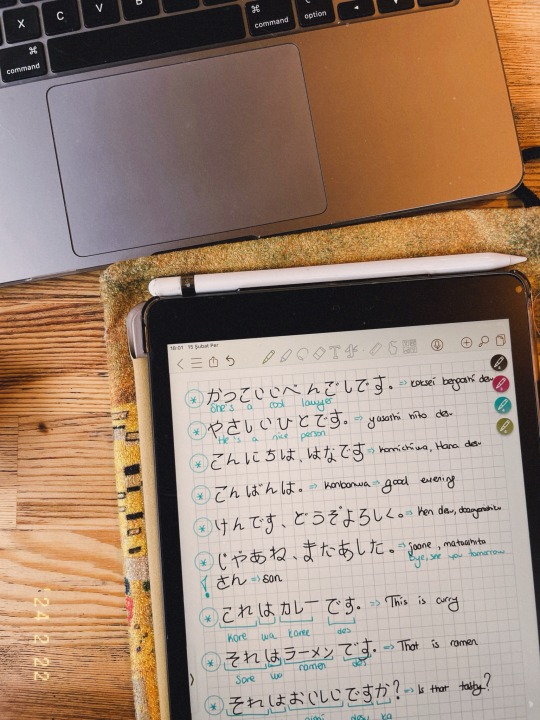



learning japanese update: i’ve been practicing writing down sentences and trying to understand the sentence structure. linguistically, japanese and turkish have similarities, so i can say that it’s been going well and i’m having sooo much fun!!
#langblr#lunlunstudies#learning japanese#japanese learning#language lessons#second language#japanese language#language learning#language#langblog#studying#studyblr#studyspo#studystudystudy#study motivation
500 notes
·
View notes
Text
"the reason adrien is just instantly good at everything he tries is because he is programmed to be that way as a senti" aside from the fact that i don't think that's how it works (and also while he was decent at everything he tried with marinette he wasn't instantly good at all of them, and what marinette actually said to him was that he could improve in anything with practice but it was a great first attempt) did we all collectively forget about how adrien actually canonically isn't the best singer?

#adrien agreste#miraculous#miraculous ladybug#ml s6 spoilers#ml season 6#ml climatiqueen#miraculous spoilers#ml spoilers#actually never saw that episode in french so maybe the french voice actor did a better job idk but given that adrien doesn't#usually sing for kitty section or ever the way i saw it was he used his poetry writing skills to write a song#and as a songwriter he was probably great but being a good lyricist doesn't make you a great singer obviously#so to me that's what his deal is#i actually like that throughout this show adrien has some things he picks up easily and some things he has to work on and might never do as#well as people with more experience#i also think as a kids show the lesson they want to put out is anyone can improve with effort and attempt#like he fumbled that science lab experiment but enjoys particle physics#languages tend to come easily to him precisely because it's been something he was forced to do since he was young#a lot of polygots especially if they start young develop skills and see linguistic patterns and iirc he already knew some#japanese from anime and his familiarity with mandarin should help#but i love that he took it further and took on morse code like the cute nerd he is#and now he's studying ancient greek for fun??? what a cute#marinette says his macarons tasted fine but we saw him struggle with the creme#what i mean to say is#he has discipline (basically second nature now) and dedication so he can do well but it DOES require effort#and i think it dismisses how much adrien TRIES or the fact that a lot of skills he was taught to have since a young age aid him#and i just don't think all sentis are “perfect” in an AI robotic way (even if that's how their parents wished they were)#it also just lessens his humanity and iirc the writers have stated multiple times that they are still human#(we can discuss how inconsistent ml is about sentis in general but eh idc for that conversation tbh agdhsjsjks)#anyway adrien will forever be#my nerdy son i love him so much
48 notes
·
View notes
Text
hey guys! im looking to learn japanese! any tips or resources or anything like that you can recommend? ☆
ive looked all over the internet and found some pretty good stuff, but i dont really know which books to get since im learning it on my own without joining a class lol
im not joining a class coz rn im broke and maybe once i get a job ill join, but i thought it would be good to get some pre requisite knowledge no?
30 notes
·
View notes
Text
Unlocking Advanced Japanese Learning: My Go-To Resources and Techniques for Self-Learning
As a Japanese teacher and lifelong learner, my journey with the language never ceases. Progressing in Japanese as a self learner or adult learner requires not only dedication but also the right resources. While textbooks are invaluable for building foundational grammar and vocabulary, finding suitable materials becomes more challenging as you advance. However, this doesn’t mean opportunities are…

View On WordPress
#authentic Japanese materials#Japanese language learning#Japanese lessons#Japanese with Shun#Japaneselanguage#learn japanese#NHK News Web Easy#nihongo#日本語
40 notes
·
View notes
Text
I will warn you: this post gets pretty deep into the weeds talking about the copula and how it is constructed; if you don’t need to understand something in extreme depth to feel satisfied, this post probably won’t be for you. But if you’re like me and feel things click and become more intuitive when you really deeply understand how it all goes together like a puzzle, hopefully this will help you! If you’re interested in super technical linguistic-y stuff, you’ll probably enjoy this.
#japanese#japanese grammar#japanese lesson#japanese linguistics#japanese parts of speech#japanese study#langblr#language#language learning#learn japanese#linguistics#original post#studying
25 notes
·
View notes
Text
[Japanese→English] @smallplasticgoose Japanese Duck Idiom — Color Coded Translation
Link to original post

⎯⎯⎯⎯⎯⎯⎯⎯⎯⎯⎯⎯⎯⎯⎯⎯⎯⎯⎯⎯⎯⎯
鴨が葱を背負って来る
かもがねぎをしょってくる
A duck comes carrying leeks on its back
This is an idiom equivalent to “Along comes a fool begging to be departed from his money.”
⎯⎯⎯⎯⎯⎯⎯⎯⎯⎯⎯⎯⎯⎯⎯⎯⎯⎯⎯⎯⎯⎯
Please correct me if I made a mistake
#color coded translation#japanese to english#japanese#japanese language#study japanese#japanese lesson#japanese vocab#japanese learning#learn japanese#learning japanese#japanese culture#日本語#日本語勉強中#日本語の練習#日本語の勉強#日本語勉強#japanese vocab list#japanese vocabulary
13 notes
·
View notes
Text


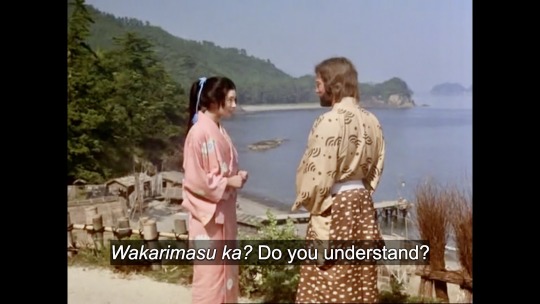
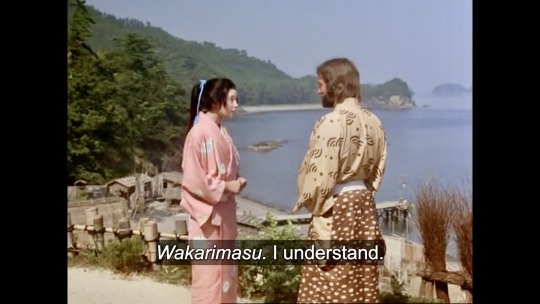
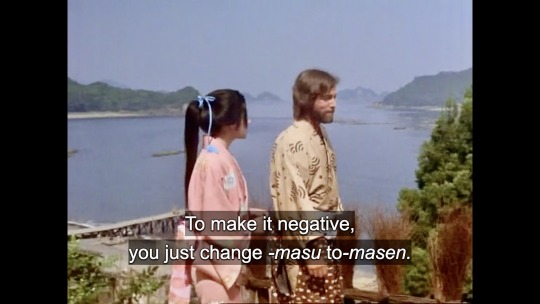
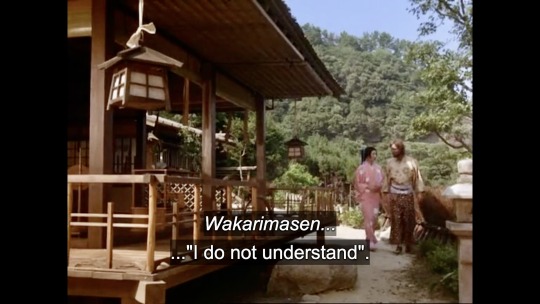
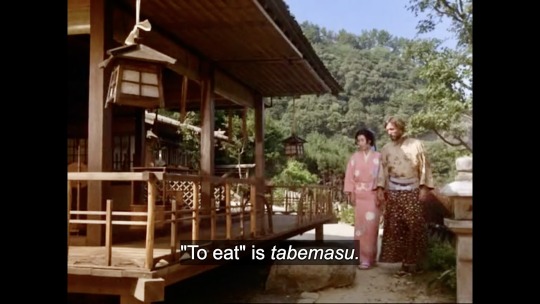

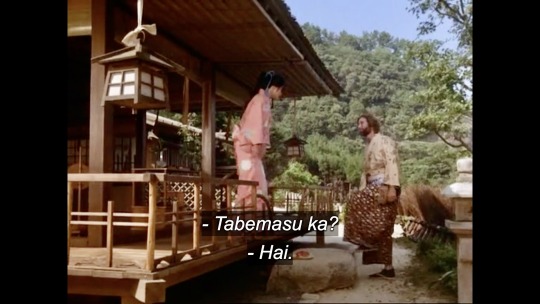

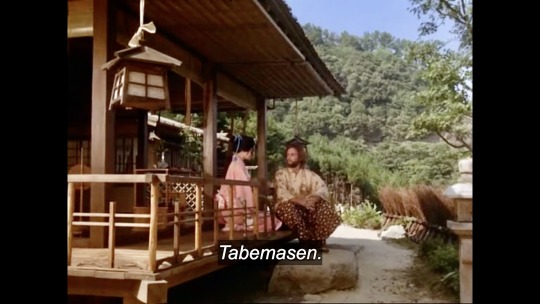
Shogun (1980)
Learning Japanese by the seaside with a pretty teacher. Sign me up. 😆
#shogun#shogun 1980#richard chamberlain#yoko shimada#japan#japanese language#learn japanese#japanese lesson
362 notes
·
View notes
Text
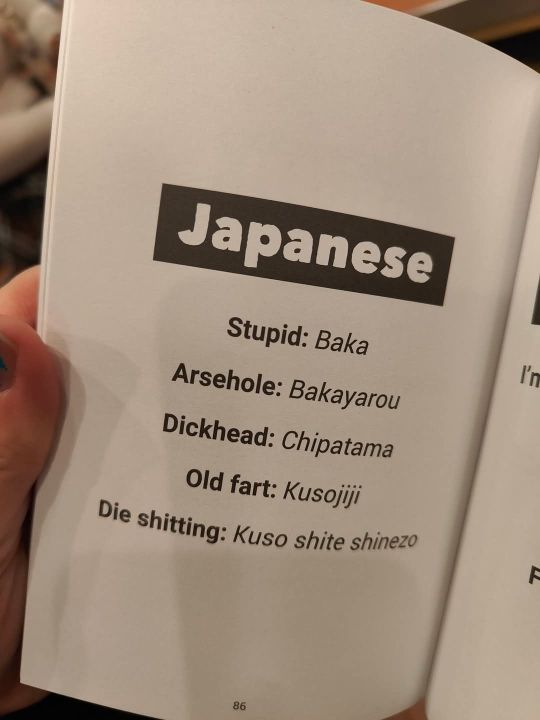
7 notes
·
View notes
Text
JLPT N5 - している [Part 2]
Hey everyone, welcome to Part 2 of talking about している. This N5 grammar point is very basic but also very important. Let’s get into it shall we!
But first, here is your vocabulary:

【English Helping Verbs】
As I mentioned in Part 1, the “して“ in している can stand for any verb in て form. Sometimes it is actually する, but most times it will be some other verb.
Ok great, but what is the いる part?? Take a look at the following English sentences:
① Traffic accidents often occur here.
② I am eating.
③ The window is open.
Two of these sentences have both a helping verb and a main verb. In #1, there is only a main verb, which is “occur”. In #2 the main verb is “eating” and the helping verb is “am”. In #3 the main verb is “open” and the helping verb is “is”. Notice that one of the main verbs has the -ing suffix while the other two don’t. Make a mental note of this for later. 😉
【The いる in している】
Japanese also has helping verbs. Allow me to introduce you to one of the most common ones: いる!
The いる helping verb* adds nuance to the main verb. But here’s the thing - there are different versions of いる!In the している Part 1 article, you actually saw what I call the いる of Repetition. This いる does not translate to the -ing form of our verbs in English. If you see よく起きている for example, you should think “often occur(s)”. This is similar to example #1 above.
Examples #2 and 3 are not actions of repetition. For them, we need the other いる, which I call the いる of State or Condition. This いる sometimes makes us use that -ing suffix in our English translations. So if you just see 食べている, by default it would mean “started eating and then stayed in that state for some period of time”. Instead of all that, in English we would simply say “is eating”. This is similar to example #2 above.
開く is a different type of verb than 食べる**. Because of this, the いる of State or Condition does not lead to us using the -ing form. In this case, something is open and stays in that state for some period of time. We don’t say “is opening”. Instead we just say “is open”. For verbs like 開く, their English translations won’t use that -ing form. Instead they will be like example #3 above.
The key to the している grammar point is understanding what kind of main verb you have, and then which helping verb いる you are reading/hearing!
【いる of State or Condition】
Here are some examples where the helping verb いる expresses a state or condition.

This is how you say example #3 in Japanese.

= Tom is currently in the Philippines.
Interestingly, you could also say the following:
⑥ トムはフィリピンに来ています。***
⑦ トムはフィリピンにいます。
#5, 6 and 7 all say that Tom is in the Philippines but the nuance is different in each of them!
#5 says that Tom went to the Philippines and stayed there. This means that the speaker is NOT in the Philippines. On the other hand, #6 says that Tom came to the Philippines and then stayed there, meaning that the speaker is also there. #7 simply says that Tom is in the Philippines. We don’t have any information about where the speaker is located.

= Mizuki is wearing a white skirt and hat.
#8 has several things that I want to point out: First is that the て form of a verb can mark the end of a comment. Example 8 has two comments of equal value. This is one version of a Japanese compound sentence.
The second thing is that the ending helping verb can actually apply to TWO DIFFERENT main verbs! Native speakers hear #8 and understand the verbs to be both はいています as well as かぶっています.
The last thing is that verbs connected to clothes are very interesting. When you attach the helping verb いる, they can sometimes express the state of wearing something. However, in some contexts they can instead express the action of putting something on. For the N5 level luckily you won’t have to distinguish between wearing and putting on clothing so no worries. It is good to keep this tidbit in the back of your mind for the future though.
【Conclusion】
So there you have it. Now you know that the している grammar point can express several situations. You could have:
・Repetition - there will be a word/phrase that indicates that the action happens repeatedly. The English translation won’t use the -ing form of a verb
・State or a Condition - there MAY or may not be a word/phrase indicating repetition. The main thing to focus on is whether the verb is an action verb or not. This will help you decide if you need -ing or not.
As always, keep your eyes and ears open for different kinds of examples and try to notice patterns. You can do it!
Rice & Peace,
– AL
👋🏾
*I purposely say “the helping verb いる“because there is also the regular いる verb. It’s the same with the “be���, “do” and “have” verbs in English. “Am” in “I am a teacher” plays a different role than the one in “I am eating.”
** 食べる is a transitive verb while 開く is an intransitive verb. Usually transitive verbs will translate to -ing and intransitive verbs won’t. Of course there are exceptions so keep an open mind.
*** When choosing between 来ている、行っている、and いる think about where the speaker is located as well as if you want to stress the movement of the subject.
#japanese#japanese studyblr#japanese language#japanese grammar#日本語#isshonihongo#jlpt n5#jlptn5#jlpt#nihongo#japanese langblr#learn japanese#japanese lesson#japanese study#studying japanese#japaneselessons#learnjapanese#language#languages#language study#language studyblr#language blr#日本語の勉強#にほんご
63 notes
·
View notes
Text
I have so many things to do in such little time 😅

#study break#lesson plan#lesson planning#follow#fyp#study#mood#life#academia#like reblog#new studyblr#studyblr#academics#academic comeback#locking in#locked in#topics#history#modern history#languages#language exchange#Japanese#Japan#Australian History#Australia#New Zealand History#New Zealand#Aussie#Kiwi#autumn
7 notes
·
View notes
Text
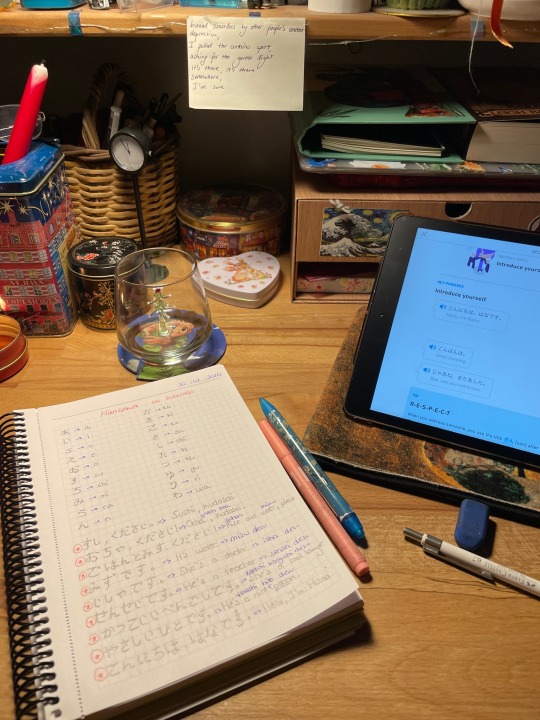
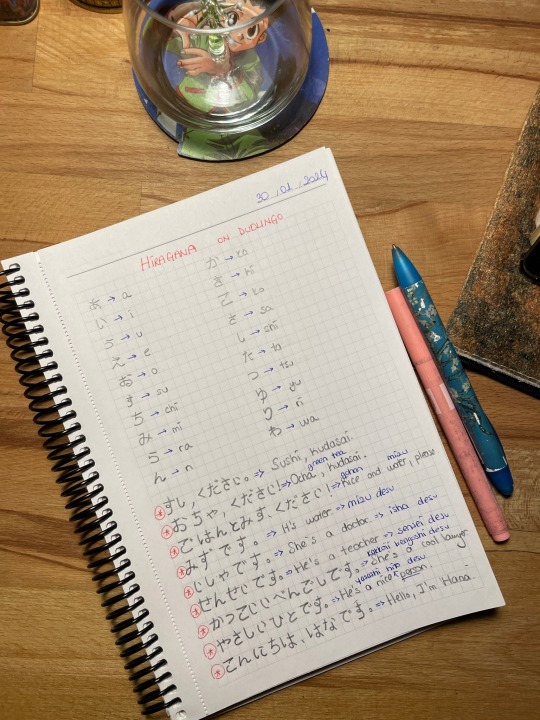
so… i have been learning japanese!!! my german course will start in a couple of months and i’m excited to keep learning it, however learning japanese is in my 2024 goals :] since i started japanese dramas, i’ve been interested in the language. for now i am just learning from and practicing on duolingo. i’m looking for (and have found) some free online books and i’m gonna start studying using them as well. i don’t know why but it brings me so much joy when i remember words or build sentences with what i know. i really hope i can improve my japanese :]
#studying#studyblr#studyspo#studystudystudy#study motivation#study blog#studygram#student#studyinspo#lunlunstudies#language lessons#second language#language learning#language#japanese language#japanese langblr#japanese learning#langblr
169 notes
·
View notes
Text

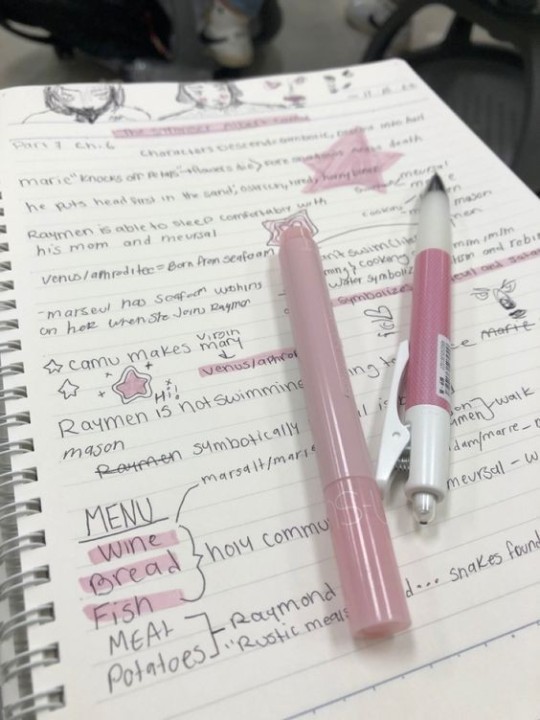

Language Learning Update 🎀
So, this langblr started out for just Spanish but I've decided that I want to pursue learning three languages (out of the many I'd love to know) at the same time. I'm near A2 level in Spanish, my Japanese knowledge needs some work, and I've decided to add on Korean as well.
As many of you know, I'm currently out of town for work, and I didn't bring and Japanese study materials that I like to use. However, I discovered the Talk to Me in Korean website and found pdfs of their Level 1 and 2 textbooks, so I want to spend the next 6 weeks on Korean and Spanish, and see how I feel once I'm back home and university is going again.
I know learning languages both takes time and is a life long process. As long as I can stay consistent even with a bare minimum a day, I know I will be successful in the long run. It's impossible to acquire a language overnight, so I'm determined to make time for these languages and understanding of the commitment this will take.
Even when I've drifted from my languages learning, I ALWAYS come back to it. I love learning and I love communication. So this is something I'm ready to buckle down in, as many times as it takes.
If anyone has any good resources for learning Korean, Japanese, and Spanish, feel free to comment or message me them! Always looking for entertainment and study resources to accent my learning journey <3
til next time lovelies 🩷
#college student#college studyblr#foreign languages#it girl#langblr#language goals#language learning#language resources#language studyblr#spanish#japanese language#language#korean langblr#japanese langblr#spanish langblr#language learning goals#langblog#langblr community#languages#langauge learning#learn spanish#learn japanese#learn korean#language study#korean study#spanish studyblr#korean studyblr#japanese studyblr#language lessons#language learning tips
34 notes
·
View notes
Text
Me, first learning kana: Wow I love how straightforward Japanese pronunciation is, it's really nice to not have to wonder how things are pronounced.
Me, learning kanji: oh what the fuck actually
Me, now learning about the types of keigo and how they affect conjugation and pronunciation:

#did you know that there's levels of formality to japanese speech?#which don't just determine the words you use and your tone of voice but also the conjugation and pronunciation!#basic words like ''eat'' dound entirely different based on who you're speaking to!#the standard formality levels are polite (keigo) - casual - rude#and keigo has four (or five depending on who you ask) subtypes! with varying levels of formality and unique pronounciations!#and those types are standard formal (what language lessons start out by teaching)#elevating the other person's status (when talking about someone who is a higher social rank than you)#humbling yourself (when talking about yourself to or in comparison to someone who is a higher social rank than you)#and humbling yourself (when there isn't really anyone who is a higher social rank than you but you want to sound polite and not braggy)#and depending on who you ask there's also a ''beautifying'' one where you add specific sounds to words to make them sound prettier#like saying お寿司 (o-sushi) instead of just 寿司#there are pronunciations and phrases that are completely unique to each kind of speaking style#and many of them are irregular and have to be memorized individually#i am going to fucking die#日本語の学生#japanese langblr#langblr
69 notes
·
View notes